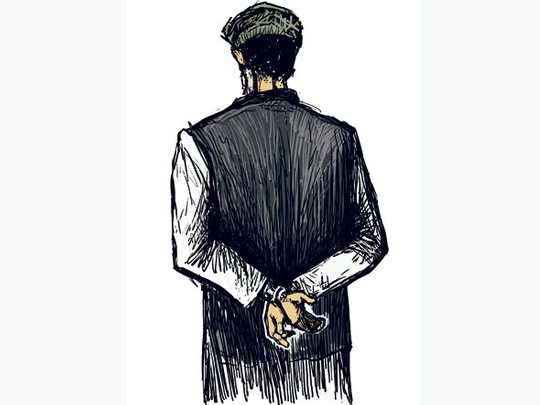
Discouraged by its failure to turn the tide through street demonstrations, Iran's opposition movement is considering its future moves. Thrown into the debate is a suggestion that the time has come for armed struggle. The argument goes something as follows: the present regime is maintained in power through force and could only be destabilised by a matching degree of violence.
Armed struggle as a revolutionary tactic has always had a romantic appeal for those looking for a quick way to power. The trouble is that armed struggle seldom achieves power for those who practice it and when it does it often produces an oppressive regime.
Iran's opposition strategists would be unwise to be seduced by the siren songs of armed struggle. All they need to do is contemplate the fate of one Abdul Malik Rigi, the leader of the ethnic Baloch rebel group known as Jundallah (Soldier of God).
Rigi is blamed for the deaths of over 100 members of the Islamic Revolutionary Guards, including several senior commanders, and members of other security organisations of the republic, not to mention dozens of civilians as ‘collateral damage'.
Last week, however, Rigi's luck ran out when a Pakistani passenger plane in which he was travelling to an un-named Arab country was forced to land in Iran. Within minutes of the forced landing, Rigi was in the hands of the Islamic Revolutionary Guards. The incident raises a number of questions.
First, how did the authorities learn about Rigi's presence in the Pakistani aircraft? Everyone knows that Rigi travelled with different passports, using different aliases. One must assume that he would have taken some precautions before boarding a passenger plane. In any case, this was not the first time Rigi was flying out of Pakistan. Last summer he flew to Europe for a four-nation tour.
Did the Pakistani authorities inform Tehran of Rigi's presence in the plane?
No one, outside the two governments, could know for sure.
As already noted, Rigi's arrest has raised the issue of the place that armed struggle should have in the fight against the Khomeinist regime.
The People's Mujahideen, an armed group, has criticised the "Green" opposition movement for its "utopian reliance on peaceful protest". The Party of Kurdish Life (PJAK), the Iranian branch of the Kurdistan Workers Party (PKK), has expressed similar views. A number of smaller Maoist groups have gone further by calling for urban guerrilla operations.
Iran's democratic opposition should think twice before listening to such groups. Rigi's arrest shows the limits of armed action and the ultimate failure of a strategy based on violence. Although the Khomeinist regime is a repressive machine, it has not yet succeeded in closing all avenues for expressing dissent.
Harsher crackdown
In most cases, armed struggle degenerates into terrorism. And that provides the military-security coalition with a pretext for strengthening its hold on power and urging an even harsher crackdown against the opposition. Often, terrorism and military-security oppression form a couple engaged in a deadly dance.
Rigi's ‘armed struggle' did more harm than good even to Iran's Baloch people.
His attacks enabled the regime to push aside legitimate Baloch grievances and portray as ‘terrorists and foreign agents' all those who demanded a fair deal for an oppressed people.
With or without Rigi, the fact remains that Iranian Balochis are victims of systemic discrimination.
Life expectancy in the province of Sistan and Balochistan is a full 10 years lower than the Iranian national average. Illiteracy in the Balochi parts of the province is six times higher than the national average and unemployment hovers around an incredible 40 per cent.
The province is granted less than a quarter of one per cent of the public investment, much of it allocated to military projects that generate few jobs for the locals.
More than a third of the Baloch work force manage to earn a living, thanks to seasonal jobs in other parts of Iran, especially Khorassan. Many more immigrate to other countries of the region or to North America
Iranian Baloch are also victims of cultural and religious oppression. The regime spares no effort to wipe out Balochi, an ancient language.
More than 80 per cent of Iran's estimated two million Balochi citizens are Sunni Muslims and as such victims of religious discrimination. Over the past 30 years, all but four of the schools teaching Islamic Sunni theology in Iranian Balochistan have been shut by the regime. Many Baloch clerics, known as maulawis, have been expelled from the province and at least two dozen have been murdered in mysterious circumstances.
Rigi's ‘armed struggle' did nothing to rectify the injustice that the regime is doing to the Balochi people. His capture, however, will not hide that injustice. Nor will it change the atmosphere of violence and insecurity that reigns in a large chunk of southeast Iran.
The opposition movement must address the fact that, under the Khomeinist regime, Iran's religious and ethnic minorities are subjected to a double injustice and offer credible guidelines for tackling the problem.
Last year, Mahdi Karroubi, one of the key figures of the opposition, briefly flirted with the subject before quickly moving away from it. That is not good enough. More serious work on the subject is needed.
Amir Taheri is an Iranian writer based in Europe.










